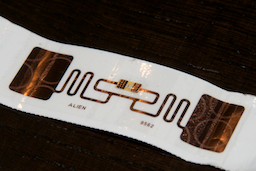(I registered a few hours ago but gave up waiting for a confirming email and am posting unregistered).
Disclaimer: I work for an RFID reader and tag supplier that sells glass tags that are implanted in animals.
> I know Verichip over time, had a huge problem with animal implant
> subjects developing fast growing cancers at the implant site,
Verichip had no problem with animals developing cancer due to tag implants. It was reported as an incidental finding (a curiosity) in a single non-cancer research study where some tagged mice developed cancer. The paper author noted it was not a significant sample size and not necessarily caused by the tag. No other tagged animal study has shown there is a link to cancer and lots of institutions have RFID tags for medical research including cancer studies for many years.
RFID tags have been implanted in millions of animals (cattle, livestock, pets, wildlife) for over 30 years and no correlation with cancer has been discovered. Millions of cats and dogs are tagged all over the world. Is there an epidemic of cancer in cats and dogs in the neck near the implant? RFID tagging of sheep and cattle is done to track disease (e.g. mad cow). If tags were causing cancer in food animals the problem would have recognized and stopped long ago.
Glass is a fairly inert material and can exist inside living tissue without rejection. The tag has no power until it is within range of a reader's magnetic field which inductively charges the tag to send 10 bytes (64 bit unique identifier and 16 bit checksum) using a weak magnetic signal. The radio signals in animal tags use magnetic fields so they can travel through water but are easily blocked by metal.
> which BTW is said to be why this human trial was done in Mexico
> and not in the U.S.
The Mexicans tagged were not a medical trial. It was a security system.
Verichip lost their shirt trying to get into the human tagging business because it was a stupid idea that nobody wanted. They spent millions of dollars to put readers in Florida hospitals to identify disoriented people and nobody was interested in signing up. The Verichip division was sold off and has been re-branded and the parent company, Digital Angel, has since sold the rest of its animal tagging business (Destron) to a small company in Boise, who has no plans to tag people.
As for those who fear the government will force them to be tagged, I can only ask what would be the reason? The tag can only be read within a few feet of a reader (too far for black helicopters, it can't be read outside your house when you're inside) and if two tags are in the same field then neither can be read, so you can thwart the system by cuddling with another tagged person as long as you hold the same hand (or press foreheads together). A thin piece of metal foil is enough to block the signal from the reader. Magnetism is a near field force that does not project very far, particularly from a 2 mm diameter coil that is a little longer than a grain of rice.
Low frequency RFID tags do not work well in an electrically noisy environment with magnetic fields and have poor performance in the presence of laptop power supplies (switchers are the worst), florescent lights (CFL also terrible), electric motors and generators (power tools), high voltage power lines (aerial or buried), vehicle ignitions and the like. Things that may actually give you cancer.
What would be the motivation to inject 300 million people with a glass encapsulated circuit that can easily be thwarted by holding hands, operating a drill or with a foil candy bar wrapper? It would cost hundreds of millions of dollars to implement a national tagging program and it would certainly draw significant media attention. And if citizens were somehow convinced/coerced to go along with this (national security, ACA), what capability would it really offer to those who want to do this to us? Who would need to wirelessly read your unique number while at close range? Credit card companies do but they find it easier to put the chip in the card.
RFID could be used to identify you but it's much better to use your cell phone (worldwide locator), driver's license (photo and address), address written on the front of your house, credit card, the tags in your car tires (10 year old federal law requires unique tire IDs and many use RFID), facial recognition system, company ID card, car license plate, social security number, unshredded trash, etc.
The purpose of RFID in the ACA is to have a wireless way to identify and track medical devices. The ACA includes methods designed to decrease the cost of medical care and RFID can be a good tool if used properly. Modern hospitals put RFID tags on defibrulators and other shared devices and use real time location systems (building-wide reader network) to find them. That saves money.


